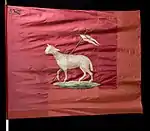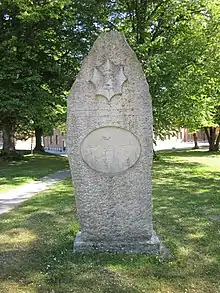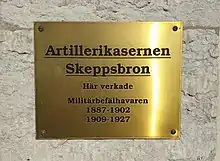Gotland National Conscription
The Gotland National Conscription (Swedish: Gotlands nationalbeväring) was a Swedish Army infantry unit that traced its origins back to the 19th century. It was split into two new regiments in 1887. The regiment's soldiers were recruited on the island of Gotland.
| Gotland National Conscription | |
|---|---|
| Gotlands nationalbeväring | |
| Active | 1811–1887 |
| Country | Sweden |
| Allegiance | Swedish Armed Forces |
| Branch | Swedish Army |
| Type | Infantry |
| Garrison/HQ | Visby |
| Insignia | |
| Battalion colour m/1849 |  |
History
Gotland National Conscription was raised in 1811 through an agreement, a convention between the people of Gotland and the king.[1] It became Sweden's first military conscript defence with exercise duty even in peacetime. It mobilized nearly 20% of the population and raised four battalions in addition to artillery. The officers were appointed by the King; non-commissioned officers were elected by the men. In 1887, the Gotland National Conscriptio was reformed into two separate units, the Gotland Infantry Regiment and the Gotland Artillery Corps.[1]
Organisation 1861


Northern battalion (which in 1870 consisted of 5,040 men) consisted of the following companies:[2]
- Fårö company: Fårö socken
- Rute company: Rute, Fleringe and Bunge socken
- Forsa company: Lärbro, Hellvi and Tingstäde
- Bals company: Othem, Boge, Hejnum and Bäl
- Lina company: Hörsne, Bara, Gothem and Norrlanda
- Stenkyrka company: Stenkyrka, Hangvar and Hall
- Lummelunds company: Martebo, Lummelunda and Väskinde
- Halla kompani: Dalhem, Ganthem and Halla
Visby battalion (which in 1870 consisted of 1,690 men) consisted of the following companies:[2]
- Visby jäger company
- Visby infantry company
- Endre company: Endre, Hejdeby, Barlingbo and Ekeby
- Dede company: Roma, Björke, Follingbo and Akebäck
- Bro company: Bro, Fole, Lokrume, Källunge and Vallstena
- Stenkumla company: Stenkumla, Västerhejde, Träkumla, Vall and Hogrän
- Eskelhems company: Eskelhem and Tofta
Middle battalion (which in 1870 consisted of 1,730 men) consisted of the following companies:[2]
- Sanda (Banda) company: Sanda, Västergarn and Mästerby
- Klinte company: Klinte and Fröjel
- Hejde company: Hejde, Väte and Atlingbo
- Sjonhems company: Sjonhem, Viklau, Vänge, Buttle and Guldrupe
- Östergarns company: Östergarn, Gammelgarn and Ardre
- Thorsburgs company: Kräklingbo, Ala and Anga
- Garda company: Garda, Etelhem, Alskog and Lye
Southern battalion (which in 1870 consisted of 2,350 men) consisted of the following companies:[2]
- Närs kompani: När and Lau
- Burs kompani: Burs and Stånga
- Fardhems kompani: Fardhem, Linde, Lojsta, Levide and Gerum
- Hablingbo kompani: Hablingbo, Silte, Eksta and Sproge
- Hemse kompani: Alva, Hemse, Rone and Eke
- Havdhems kompani: Havdhem and Näs
- Gröttlinge kompani: Grötlingbo and Fide
- Hoburgs kompani: Öja, Hamra, Vamlingbo and Sundre
The number of conscripts amounted to 8,496 men and the officer corps comprised 111 men. The state cost for the conscripts amounted to 139,562 riksdaler and 92 öre, of which the military accounted for 2,000.[2]
Commanding officers

Skeppsbron
Here worked
the Military Commander
1887–1902
1909–1927"
The Military Commanders of Gotland from 1811 to 1886. After Lennart Reuterskiöld's withdrawal as military commander the post of Military Commander and County Governor came to be united until 1873, then the posts were separated into two. Both Rudolf Cederström and Lennart Reuterskiöld were Military Commander and Deputy County Governor.[3]
- 1810-08-22 – 1811-11-03: Rudolf Cederström
- 1811-11-03 – 1812-08-31: Lennart Reuterskiöld
- 1812-08-31 – 1817-03-26: Carl Fredric Aschling
- 1817-03-26 – 1831-06-30: Jacob Cederström
- 1831-06-30 – 1849-11-23: Michael Silvius von Hohenhausen
- 1849-11-23 – 1858-07-17: Gustaf Jacob af Dalström
- 1858-07-17 – 1862-05-13: Gillis Bildt
- 1862-05-13 – 1873-09-20: Henrik Gyllenram
- 1873-09-20 – 1884-04-09: Ernst von Vegesack
- 1884-04-09 – 1895-07-29: Herman von Hohenhausen[note 1]
See also
Footnotes
- When Gotland National Conscription was reorganized in 1886 von Hohenhausen became the commanding officer of Gotland Infantry Regiment (I 18).[3]
References
Notes
- Catoni 1992, p. 19
- Snöbohm 1871, pp. 36-38
- Hammarhjelm 1999, p. 251
Print
- Catoni, Mac, ed. (1992). Pansartrupperna 50 år 1992-10-01 (PDF) (in Swedish). [Stockholm]: [s.n.] SELIBR 9958126.
- Hammarhjelm, Bengt (1999). Beredskap på Gotland 175 år: 1811-1986 (2nd, ext., plus complementary to 2000 ed.). Visby: Ödin. ISBN 91-85716-84-7. SELIBR 7751982.
- Snöbohm, Alfred Theodor (1871). Gotlands land och folk: hufvuddragen till en teckning af Gotland och dess öden från äldre till nuvarande tider. Örebro. SELIBR 1585140.